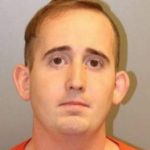A South Carolina jury has found 29-year-old Jacop Hazlett guilty of sexually abusing multiple children while volunteering to keep an eye on preschoolers while their parents worshipped at NewSpring Church, a non-denominational megachurch that originated as a church plant sponsored by the South Carolina Baptist Convention.

Jake Hazlett
Hazlett, arrested in November 2018 after a church member came forward saying their child had been abused by one of NewSpring’s volunteer childcare workers, was sentenced to 75 years in prison after a two-day trial Wednesday and Thursday.
Hazlett did not testify, and last month he rejected a plea bargain for 50 years in prison.
During the trial and deliberations, according to local media, jurors watched surveillance video showing Hazlett appearing to molest a 3-year-old boy in a bathroom at the Charleston campus of NewSpring Church — a multi-site congregation with campuses across the state of South Carolina — during Sunday services on Sept. 30.
After learning of the incident, church leaders reviewed archived security camera footage and found 14 similar incidents in the previous 90 days. The church, which is facing several lawsuits related to Hazlett’s conduct, had a policy to discard security video after three months. Hazlett worked with children at NewSpring for a total of nine months.
Hazlett previously had volunteered to watch children at Elevation Church, a similar multi-site megachurch started a decade ago as a church plant of the Baptist State Convention of North Carolina. After a couple of months there he was moved to a different volunteer role because church leaders had an “uneasy feeling” about his interaction with children.
In 2007 Hazlett, then 17, pleaded guilty to inappropriately touching a young Ohio boy and served 21 days in jail. NewSpring Church officials said they performed a screening process that included a criminal background check and one interview before permitting Hazlett to go through training and volunteer with children, but it revealed nothing about either the previous arrest or suspicions at Elevation Church.
Under scrutiny since the Houston Chronicle and San Antonio Express-Journal began reporting in-depth in February on widespread abuse allegations within churches and agencies of the Southern Baptist Convention, leaders of the nation’s second-largest denomination this summer began implementing safeguards intended to make it harder for sexual predators to move undetected from church to church.
A credentials committee, previously assigned the task of accrediting messengers to vote at SBC annual meetings, became a standing committee authorized year-round to handle disputes concerning whether churches are “in friendly cooperation” with the national body.
This month the committee established an online portal providing individuals an opportunity to file reports concerning sexual or other forms of abuse, racial or ethnic discrimination or any other concern about whether a particular church meets the denomination’s standards of faith and practice.
The credentials committee is empowered to “make inquiries” into a church accused of violating those standards but not to “investigate” autonomous churches that voluntarily associate with the national body. Published materials are unclear about the difference.
“Why would we trust SBC leaders to determine if abuse is credible when they never acted on the cases they found credible?”
According to its assignment statement, the credentials committee “will not be able to consider anonymous submissions about a church” and may share the identity of the individual or individuals making the allegations “if necessary to adequately garner the information necessary to fully vet the concern.”
Deliberations will remain confidential unless the committee believes a church should be declared no longer in cooperation with the SBC. At that point it will recommend removal to the SBC Executive Committee, which in the past has directly inquired into churches that were subsequently kicked out for violating the denomination’s condemnation of homosexuality.
Reaction among abuse survivors is mixed. Susan Condone and Megan Lively, two survivors still active in the Southern Baptist Convention, urged patience to give the credentials committee time to refine the policy over time.
Others who left the church because of their abuse criticized the process as confusing and said others like them are unlikely to place much confidence in the system.
“Have they not learned that the very voices they recognized at the Caring Well Conference all reported our abuse in the SBC and none of us had our abuse handled appropriately,” tweeted Anne Marie Miller, author of Healing Together: A Guide to Supporting Sexual Abuse Survivors. “Why would we trust SBC leaders to determine if abuse is credible when they never acted on the cases they found credible?”
